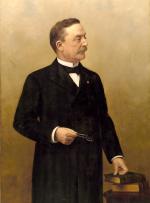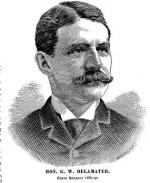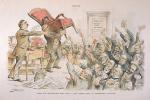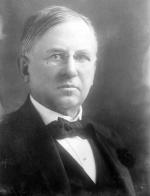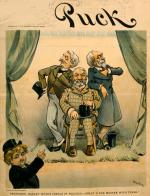![header=[Marker Text] body=[Home of the noted state and national political leader is near here. He rose , between 1856-87, from local and state offices to U.S. Senator. A Republican Party leader from 1887 until his death in 1904. ] sign](http://explorepahistory.com/kora/files/1/10/1-A-3B1-139-ExplorePAHistory-a0m7m3-a_450.jpg)
Mouse over for marker text
Name:
Matthew S. Quay
Region:
Pittsburgh Region
County:
Beaver
Marker Location:
Pa. 68 (3rd St.) at Insurance St., Beaver
Dedication Date:
July 22, 1949
Behind the Marker
Except for George Washington Plunkett of New York, no political boss in the late 1800s was as quotable as Beaver County's Matthew Quay, who once famously described politics as "the art of taking money from the few and votes from the many under the pretext of protecting the one from the other." "I don't mind losing a governorship or a legislature now and then," he commented, "but I always need the state treasuryship."
Born in 1833 in Dillsburg, Pennsylvania, Quay was the son of an impoverished Presbyterian minister. He attended Jefferson College (today's Washington and Jefferson College) and became a lawyer in Beaver County at the age of twenty-one. There he might have remained, had the Civil War not changed his life. A colonel of the 134th Pennsylvania volunteers at the beginning of the war, he insisted on remaining with his command after suffering typhoid fever, then became the private secretary of Pennsylvania Governor Andrew Curtin. Curtin was impressed by Quay's organizational abilities to handle questions sent by Pennsylvania soldiers to the State House concerning the terms and nature of their enlistments. His fine work in this post also made him popular with soldiers throughout the state.
Governor Andrew Curtin. Curtin was impressed by Quay's organizational abilities to handle questions sent by Pennsylvania soldiers to the State House concerning the terms and nature of their enlistments. His fine work in this post also made him popular with soldiers throughout the state.
After the war, Quay allied himself with state Republican boss Simon Cameron, and served as Secretary of the Commonwealth in 1873 and again in 1879. In 1885 Quay was elected State Treasurer. Two years later the state legislature elected him to the United States Senate, and soon thereafter Quay succeeded
Simon Cameron, and served as Secretary of the Commonwealth in 1873 and again in 1879. In 1885 Quay was elected State Treasurer. Two years later the state legislature elected him to the United States Senate, and soon thereafter Quay succeeded Donald Cameron as leader of the state Republican Party. The most effective and powerful of all the state's Republican bosses, he remained in control of the party and a powerbroker in the United States' Senate, except for a brief interlude, until his death in 1904.
Donald Cameron as leader of the state Republican Party. The most effective and powerful of all the state's Republican bosses, he remained in control of the party and a powerbroker in the United States' Senate, except for a brief interlude, until his death in 1904.
Quay suffered some defeats. Two of his mistakes were responsible for the election of Democrat Robert Pattison as the only Democratic governor of the state between the 1850s and 1934. Quay so blatantly pressured Governor Henry Hoyt to pardon the legislators convicted of taking bribes from the Pennsylvania Railroad to have the state pay it for the damages it suffered during the
Henry Hoyt to pardon the legislators convicted of taking bribes from the Pennsylvania Railroad to have the state pay it for the damages it suffered during the  great rail strike of 1877 that liberal Republicans ran John Stewart as a candidate for governor in 1882 against General James Beaver. The split in the party enabled Pattison win the election. In 1890 Pattison again beat out Quay's handpicked candidate George Delamater, an undistinguished state senator, by some 17,000 votes out of 900,000 cast.
great rail strike of 1877 that liberal Republicans ran John Stewart as a candidate for governor in 1882 against General James Beaver. The split in the party enabled Pattison win the election. In 1890 Pattison again beat out Quay's handpicked candidate George Delamater, an undistinguished state senator, by some 17,000 votes out of 900,000 cast.
Only thirty-three years old when first elected as governor, Pattison had won a reputation for honesty as the Democratic city comptroller of Philadelphia who had exposed the corruption of that city's Republican machine. It was Pattison's lot, however, to call in the state militia to keep order during the strike at Andrew Carnegie's Homestead steelworks in 1892 after strikers clashed with Pinkerton detectives sent in by Carnegie's assistant
Homestead steelworks in 1892 after strikers clashed with Pinkerton detectives sent in by Carnegie's assistant  Henry Clay Frick to clear the plant for strikebreakers to work.
Henry Clay Frick to clear the plant for strikebreakers to work.
Quay's greatest moment came in 1888 as campaign manager for Republican presidential candidate Benjamin Harrison, who defeated incumbent Grover Cleveland by winning the electoral college but losing the popular vote. Concentrating on Cleveland's home state of New York, Quay hired poll watchers to observe voter fraud in Democratic New York City while it took place unchecked in Republican Philadelphia.
When Harrison attributed his narrow victory to Providence, an indignant Quay told Philadelphia reporters, "He ought to know that Providence hadn't a damn thing to do with it" and that the president would "never know how many Republicans were compelled to approach the gates of the penitentiary to make him president."
That year Quay also engineered the strategy that gave Republicans control of the House of Representatives. Quay sent party funds to districts that were still contestable in what was fast becoming the solidly Democratic South, accompanied by Pinkerton detectives whose mission it was to protect African-American and Republican voters from Democrat vigilantes. Nationwide, the GOP gained nineteen seats.
Now one of the nation's most powerful politicians, Quay had the highest absentee rate of any United States Senator, and spent long periods in Florida where he fought recurrent bouts of tuberculosis and the typhoid fever he had suffered during the war. The only committee he was interested in chairing was Public Buildings and Grounds, which meant that congressmen who wanted post offices or other buildings for their districts had to court his favor.
He thus continued on the national level the practice he had established in Pennsylvania: rewarding loyalty to the Republican Party and the high tariff, pro-business interests it represented. By doing so, Quay ensured that the GOP controlled the Pennsylvania legislature. When reform candidate John Wanamaker ran against him for the United States Senate in the Republican primary in 1898, he campaigned against "Quayism," or corruption. When Wanamaker published his speeches, Quay responded with essays proclaiming his innocence.
proclaiming his innocence.
The chief opposition to Quay came from reformers in his own party. In 1898 Quay was tried for misappropriating state funds and division within the state legislature prevented his reelection to the Senate. When Governor Daniel Hastings reappointed him, some renegade legislators successfully challenged the appointment, and Quay was removed by one vote. A new legislature then re-elected him in 1901, but Quay's power was broken. He died in 1904.
Daniel Hastings reappointed him, some renegade legislators successfully challenged the appointment, and Quay was removed by one vote. A new legislature then re-elected him in 1901, but Quay's power was broken. He died in 1904.
Mathew Quay ran the Pennsylvania Republican Party for close to twenty years. Like other heads of the Republican state political machine, Quay was one of the reasons late-nineteenth-century Pennsylvania politics was noted for nearly unfailing loyalty to the Republican Party, political corruption, steadfast support of business interests, and lack of a notable role in legislation. As the political masters of a state with great wealth and one of the nation's largest and most dynamic economies, the Pennsylvania bosses did, however, have the power to nominate, and to make or break presidential candidates.
Born in 1833 in Dillsburg, Pennsylvania, Quay was the son of an impoverished Presbyterian minister. He attended Jefferson College (today's Washington and Jefferson College) and became a lawyer in Beaver County at the age of twenty-one. There he might have remained, had the Civil War not changed his life. A colonel of the 134th Pennsylvania volunteers at the beginning of the war, he insisted on remaining with his command after suffering typhoid fever, then became the private secretary of Pennsylvania
After the war, Quay allied himself with state Republican boss
Quay suffered some defeats. Two of his mistakes were responsible for the election of Democrat Robert Pattison as the only Democratic governor of the state between the 1850s and 1934. Quay so blatantly pressured Governor
Only thirty-three years old when first elected as governor, Pattison had won a reputation for honesty as the Democratic city comptroller of Philadelphia who had exposed the corruption of that city's Republican machine. It was Pattison's lot, however, to call in the state militia to keep order during the strike at Andrew Carnegie's
Quay's greatest moment came in 1888 as campaign manager for Republican presidential candidate Benjamin Harrison, who defeated incumbent Grover Cleveland by winning the electoral college but losing the popular vote. Concentrating on Cleveland's home state of New York, Quay hired poll watchers to observe voter fraud in Democratic New York City while it took place unchecked in Republican Philadelphia.
When Harrison attributed his narrow victory to Providence, an indignant Quay told Philadelphia reporters, "He ought to know that Providence hadn't a damn thing to do with it" and that the president would "never know how many Republicans were compelled to approach the gates of the penitentiary to make him president."
That year Quay also engineered the strategy that gave Republicans control of the House of Representatives. Quay sent party funds to districts that were still contestable in what was fast becoming the solidly Democratic South, accompanied by Pinkerton detectives whose mission it was to protect African-American and Republican voters from Democrat vigilantes. Nationwide, the GOP gained nineteen seats.
Now one of the nation's most powerful politicians, Quay had the highest absentee rate of any United States Senator, and spent long periods in Florida where he fought recurrent bouts of tuberculosis and the typhoid fever he had suffered during the war. The only committee he was interested in chairing was Public Buildings and Grounds, which meant that congressmen who wanted post offices or other buildings for their districts had to court his favor.
He thus continued on the national level the practice he had established in Pennsylvania: rewarding loyalty to the Republican Party and the high tariff, pro-business interests it represented. By doing so, Quay ensured that the GOP controlled the Pennsylvania legislature. When reform candidate John Wanamaker ran against him for the United States Senate in the Republican primary in 1898, he campaigned against "Quayism," or corruption. When Wanamaker published his speeches, Quay responded with essays
The chief opposition to Quay came from reformers in his own party. In 1898 Quay was tried for misappropriating state funds and division within the state legislature prevented his reelection to the Senate. When Governor
Mathew Quay ran the Pennsylvania Republican Party for close to twenty years. Like other heads of the Republican state political machine, Quay was one of the reasons late-nineteenth-century Pennsylvania politics was noted for nearly unfailing loyalty to the Republican Party, political corruption, steadfast support of business interests, and lack of a notable role in legislation. As the political masters of a state with great wealth and one of the nation's largest and most dynamic economies, the Pennsylvania bosses did, however, have the power to nominate, and to make or break presidential candidates.




